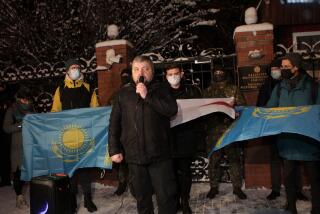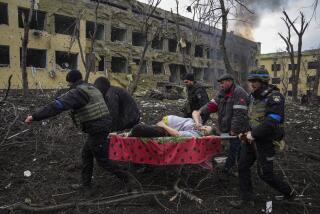Ark for the Uncalled by Vladimir Maximov; translated by Julian Graffy (Quartet: $14.95; 218 pp.)
- Share via
The setting is the Soviet Union during the chaotic period following World War II. More than 20 million of its people are dead. The country has suffered a ruinous famine and the devastation of its villages and cities. Recovery and solidarity are threatened in the struggle between Communist Party members for control, and non-party members for survival. Plagued by suspicion, betrayal, arrests and murder on both sides, men and women exist in constant fear for their lives.
Three characters dominate the story: Fyodor, a young, battle-seasoned soldier; Zolotarev, a career officer in the Soviet bureaucracy, and Josef Stalin.
Settlers are being recruited in Fyodor’s village for the development of the Kurile Island chain, newly won from the Japanese. The project is a warped dream of Stalin’s. The Kuriles, almost 5,000 miles east of Moscow, have 39 active volcanoes, a harsh climate and wretched, untillable soil.
Fyodor signs on. Sychovka, the village of his peasant ancestors, is 200 miles south of Moscow in the Tula region. He loves Sychovka, but it is a wasted and dying village now. He believes in the future of his country, and the recruiting agent has promised generous travel expenses.
Zolotarev is also a peasant from Sychovka. His excellent record of service with Soviet military headquarters in Germany has not gone unnoticed by the Kremlin. Highly recommended by Lavrenty Beria, chief of the secret police, he is hand-picked by Stalin and posted to the Kuriles as governor-general.
Zolotarev’s enthusiasm is soured when he learns that most of the recruits are from his own district, the Tula region. He believed he had escaped his past; now his father’s drunkenness, the family’s poverty and the boyhood beatings and insults he endured, are sure to be remembered--as clearly as his act of treachery to his own people when he later returned as a party spy.
Though Fyodor and Zolotarev journey by different routes to their common destination, the passage for each is agonizing and turbulent. They absorb themselves in their impossible tasks until earthquake and fire turn Stalin’s dream into a nightmare.
Zolotarev’s failure is double-edged: Politically, it means disgrace, exile and the labor camps, perhaps worse; personally, it is the realization that win or lose, he will never escape his shameful past.
It is the portrait of Stalin, however, in four cameo chapters, that is Vladimir Maximov’s best effort. Designed as an entr’acte against a backdrop of the story’s action, each chapter reveals intimate aspects of Stalin’s dark malevolence, coupled with the irony of power that corrupts and destroys him as he cold-bloodedly destroys friends and enemies.
Maximov, born in 1932, was reared in a children’s camp that harbored young criminals as well as offspring of “enemies of the people”--nonparty members. Traveling where and when he could in the Soviet Union, he worked on construction jobs and collective farms and came to know many of the characters portrayed in his novel. He quit his homeland in 1974 and now works in Paris as a magazine editor.
The book has some trifling faults. I had difficulty in separating flashbacks from the ongoing plot line. The title seems an unfortunate choice. Its meaning escapes me; I could find no clue to explain it. As for the custom of Russian novelists to burden each character with a herring barrel full of names and nicknames (e.g. Fyodor Tickhonovich Samokhin; also Fedya, Fedenka, Fedyok), I doubt that the experts of the KGB could figure who’s who without a scorecard--which, fortunately, the author has provided. Nonetheless, “Ark for the Uncalled” is a powerful novel and a convincing indictment of the Soviet communist ideology as Maximov sees it.
Julian Graffy’s translation is first rate, with a conversational freshness all too rare in translated works.
More to Read
Only good movies
Get the Indie Focus newsletter, Mark Olsen's weekly guide to the world of cinema.
You may occasionally receive promotional content from the Los Angeles Times.










